现在完成时练习(3大用法)
现在完成时的用法

___________(not meet) each other for five years.
过去的动作“完成了准备工作”,对现在的 影响是“现在已准备出发了”。
My dictionary ___. I have looked for it everywhere but still ___ it.
A.has lost; don’t find B.is missing; don’t find C.has lost; haven’t found D.is missing; haven’t found
注意:瞬间动词不能和一段时间状语,及since, for 引导的从句和短语连用。
Eg. 1.When I got to the cinema, the film had begun for ten minutes. ×
2.When I got to the cinema, the film had been on for ten minutes.
---___ the sports meet might be put off.
---Yes,it all depends on the weather.
A. I’ve been told B. I’ve told
C.I’m told
D.I told
“被告知”是过去的事,对现在的影响 是“我已知道”
A. has been writing B. writes C. has written D. had been writing
----Isn’t it hard to drive downtown to work?
(完整版)初中现在完成时练习题及答案(3)
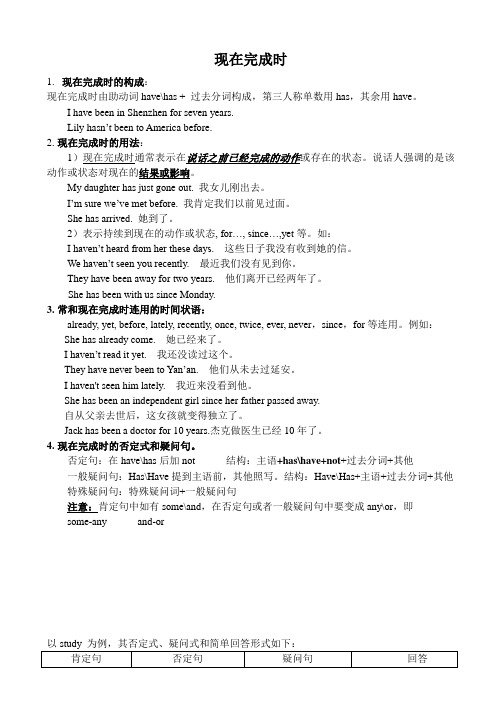
现在完成时1.现在完成时的构成:现在完成时由助动词have\has + 过去分词构成,第三人称单数用has,其余用have。
I have been in Shenzhen for seven years.Lily hasn’t been to America before.2.现在完成时的用法:1)现在完成时通常表示在说话之前已经完成的动作或存在的状态。
说话人强调的是该动作或状态对现在的结果或影响。
My daughter has just gone out. 我女儿刚出去。
I’m sure we’ve met before. 我肯定我们以前见过面。
She has arrived. 她到了。
2)表示持续到现在的动作或状态, for…, since…,yet等。
如:I haven’t heard from her these days. 这些日子我没有收到她的信。
We haven’t seen you recently. 最近我们没有见到你。
They have been away for two years. 他们离开已经两年了。
She has been with us since Monday.3.常和现在完成时连用的时间状语:already, yet, before, lately, recently, once, twice, ever, never,since,for等连用。
例如:She has already come. 她已经来了。
I haven’t read it yet. 我还没读过这个。
They have never been to Yan’an. 他们从未去过延安。
I haven't seen him lately. 我近来没看到他。
She has been an independent girl since her father passed away.自从父亲去世后,这女孩就变得独立了。
现在完成时态的用法总结
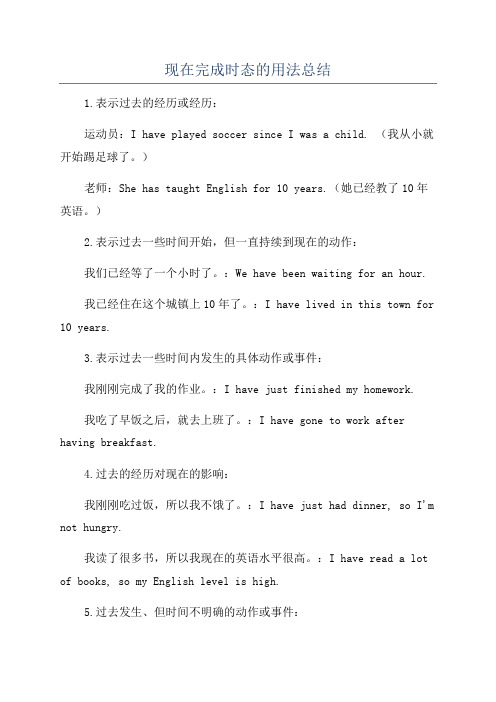
现在完成时态的用法总结
1.表示过去的经历或经历:
运动员:I have played soccer since I was a child. (我从小就开始踢足球了。
)
老师:She has taught English for 10 years.(她已经教了10年英语。
)
2.表示过去一些时间开始,但一直持续到现在的动作:
我们已经等了一个小时了。
:We have been waiting for an hour.
我已经住在这个城镇上10年了。
:I have lived in this town for 10 years.
3.表示过去一些时间内发生的具体动作或事件:
我刚刚完成了我的作业。
:I have just finished my homework.
我吃了早饭之后,就去上班了。
:I have gone to work after having breakfast.
4.过去的经历对现在的影响:
我刚刚吃过饭,所以我不饿了。
:I have just had dinner, so I'm not hungry.
我读了很多书,所以我现在的英语水平很高。
:I have read a lot of books, so my English level is high.
5.过去发生、但时间不明确的动作或事件:
我看过这部电影。
:I have seen this movie.你去过巴黎吗?:Have you been to Paris?。
初中英语_现在完成时用法及综合练习(完整)

初中英语现在完成时用法及综合练习现在完成时的构成:助动词have(has)+ 过去分词,1.表示过去发生或完成的某一动作对现在造成的影响或结果。
例如:I have just cleaned my clothes. 我刚洗过衣服。
(“洗衣服”是发生在过去的动作,对现在造成的结果是“衣服干净了”)三、现在完成时的时间状语现在完成时常用的时间状语包括―now, today, tonight, this week, this year;already, yet, just, recently…etc‖。
例如:I have had a dog now. 我现在有一个小狗了We have learned about 3000English words by the end of this term.到上学期末我们已经学了3000个英语单词。
I haven’t heared from him recently. 最近我没收到他的信.。
注意1) 当表示一段时间,现在完成时可以用for 或since引导的状语。
例如:I’ve known Li Li for 4 years. 我认识丽丽已经4年了。
I have worked here since 8 years ago. 自从8年前我就在这工作。
注意2) 当在肯定陈述句中含有already或just 时,在转换成否定句时,要把句中的already 或just 去掉,在句末加上yet.。
例如:I have already seen the film. ------ I haven’t seen the film yet.He has just come. He hasn’t come yet?already (”已经” 用于肯定句的中间和末尾处)never (“从不” 用于中间处)ever (”曾经” 用于疑问句和肯定句的中间处)just (“刚刚” 用于中间处)yet (“已经” 用于疑问句的末尾处/ “还” 用于否定句的末尾处)或不加任何的时间状语,但不能和表示过去的时间状语连用.三、现在完成时的含义之一是过去完成的动作对现在仍有影响,用以下四大标志词可以表达这种含义:1.以already, just和yet为标志already, just和yet 表示到现在为止动作或状态已经、刚刚或还没有发生。
现在完成时的三种用法

史密斯先生在中国待过10年了。
Jane has stayed in Shanghai for 3 days.
珍妮在上海待了两天。
I have taught English for 10 years.
我已经教英语10年了。
2.现在完成时,表示过去某种行为的结果对现在有直接的影响
Tom has loe finished my homework.
爸爸,我已经做完家庭作业了。
He has gone to Hong Kong.
他已经去香港了。
3.现在完成时,表示某经历的时间长度(一般用for引导的时间状语)
现在完成时的三种用法
1.现在完成时,表示曾经有过的经验(动作、状态)
I have seen Jackie Chan before.
我以前见过成龙。
Have you been to Paris?
你去过巴黎吗?
We have never heard of such a man.
我们从来没有听说过这样的人。
现在完成时讲解及练习(已用)
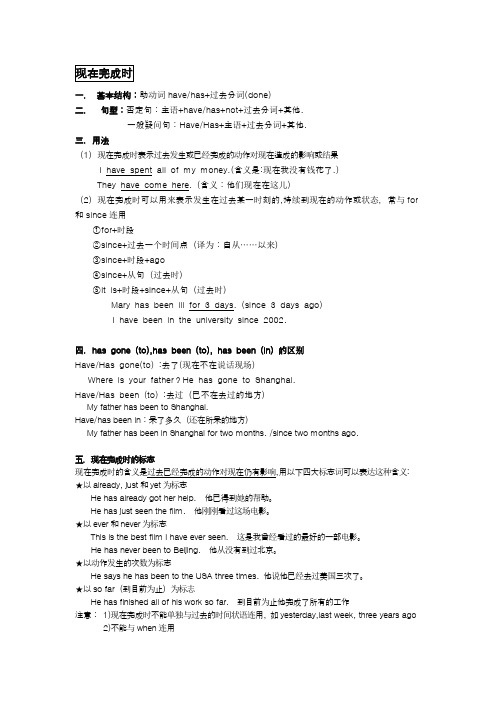
一.基本结构:助动词have/has+过去分词(done)二.句型:否定句:主语+have/has+not+过去分词+其他.一般疑问句:Have/Has+主语+过去分词+其他.三.用法(1)现在完成时表示过去发生或已经完成的动作对现在造成的影响或结果I have spent all of my money.(含义是:现在我没有钱花了.)They have come here. (含义:他们现在在这儿)(2)现在完成时可以用来表示发生在过去某一时刻的,持续到现在的动作或状态,常与for 和since连用①for+时段②since+过去一个时间点(译为:自从……以来)③since+时段+ago④since+从句(过去时)⑤It is+时段+since+从句(过去时)Mary has been ill for 3 days. (since 3 days ago)I have been in the university since 2002.四.has gone (to),has been (to), has been (in) 的区别Have/Has gone(to) :去了(现在不在说话现场)Where is your father?He has gone to Shanghai.Have/Has been (to) :去过(已不在去过的地方)My father has been to Shanghai.Have/has been in:呆了多久(还在所呆的地方)My father has been in Shanghai for two months. /since two months ago.五.现在完成时的标志现在完成时的含义是过去已经完成的动作对现在仍有影响,用以下四大标志词可以表达这种含义: ★以already, just和yet为标志He has already got her help. 他已得到她的帮助。
现在完成时态讲解及练习
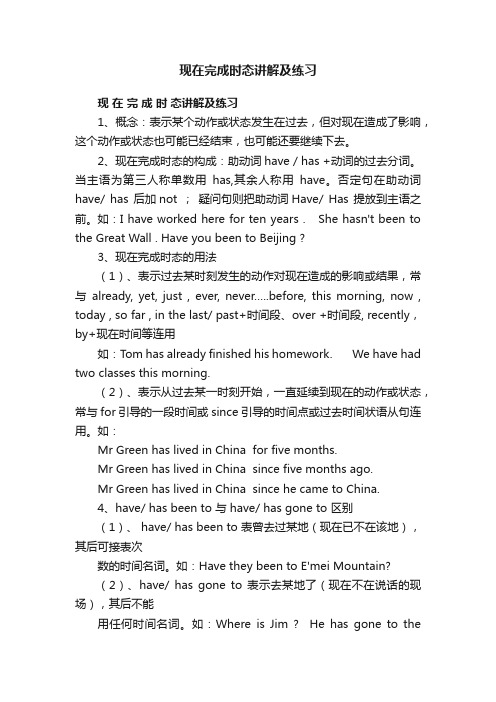
现在完成时态讲解及练习现在完成时态讲解及练习1、概念:表示某个动作或状态发生在过去,但对现在造成了影响,这个动作或状态也可能已经结束,也可能还要继续下去。
2、现在完成时态的构成:助动词have / has +动词的过去分词。
当主语为第三人称单数用has,其余人称用have。
否定句在助动词have/ has 后加not ;疑问句则把助动词Have/ Has 提放到主语之前。
如:I have worked here for ten years . She hasn't been to the Great Wall . Have you been to Beijing ?3、现在完成时态的用法(1)、表示过去某时刻发生的动作对现在造成的影响或结果,常与already, yet, just , ever, never…..before, this morning, now , today , so far , in the last/ past+时间段、over +时间段, recently,by+现在时间等连用如:Tom has already finished his homework. We have had two classes this morning.(2)、表示从过去某一时刻开始,一直延续到现在的动作或状态,常与for 引导的一段时间或since 引导的时间点或过去时间状语从句连用。
如:Mr Green has lived in China for five months.Mr Green has lived in China since five months ago.Mr Green has lived in China since he came to China.4、have/ has been to 与 have/ has gone to 区别(1)、 have/ has been to 表曾去过某地(现在已不在该地),其后可接表次数的时间名词。
现在完成时的用法总结
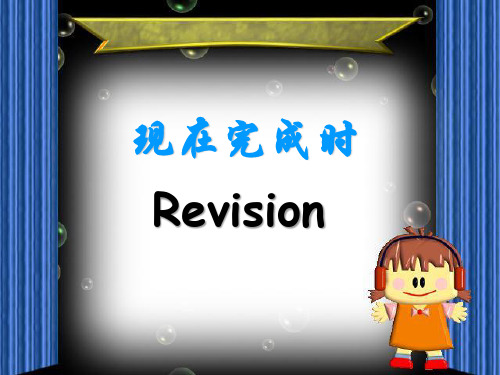
since 1985
now(2000)
(for fifteen years)
1985 [for+表示一段时间的词] now(2000)
since+表示时间点的词或时间状语从句 for +表示时间段的词
I have been a teacher since 1995. I have been a teacher since I came to Shenzhen. I have been a teacher for five years.
“since+过去时间点/从句”引导的时间状语连用。例如: We have lived here for five years. 我们在这里住了五年了。 I have known him since he was a boy. 我从他还是个孩子的时候就认识他了。
注意:现在完成时与一般过去时的区别:
现在完成时强调过去发生的事对现在造成的影响; 一般过去时指过去发生的事实。 请看下面对话中一般过去时和现在完成时的不同。
3) They have known each other _s_in_c_e__ they were children.
4) She has taught English in this school _fo_r___ about ten years.
5) He has worked in that hospital _s_in_c_e he left college.
(1997—2000) (came here)
(17/09/2000 —26/09/2000)
He has been a policeman for nine days. He has been a policeman since September 17th, 2000.
现在完成时讲解和练习(有答案)

现在完成时讲解和练习1. 现在完成时的构成: have\has+过去分词(过去分词的构成有规则变化和不规则变化)2. 现在完成时的四个基本句型肯定句He has finished the work.一般疑问句Has he finished the work? 回答Yes ,he has. No, he hasn’t.否定句He has not finished the work.特殊疑问句What has he done?3.现在完成时的用法:A.表示过去发生或已经完成的动作对现在造成的影响或结果,强调对现在造成的影想或结果)。
例如:The car has arrived. 车子来了。
(结果:车子已在门口)Someone has broken the window.有人把窗户打破了。
(结果:窗户仍破着)B. 表示过去已经开始,持续到现在的动作或状态,可以和表示从过去某一时刻延续到现在(包括“现在”在内)的一段时间的状语连用,如for+时间段、since+过去的时间点、疑问词how long等。
例如: My uncle has worked at this factory for five years. 我叔叔在这个工厂工作已经五年了。
Mr. Black has lived in China since 2002. 自从2002年Mr. Black 一直住在中国。
How long have you been here? 你来这里多久了?4. 在下列情形下用现在完成时(1)九词语①already已经肯定句中或句尾e.g.: I have already found my pen.= I have found my pen already.②yet已经否定句和疑问句句尾e.g.:I have not finished the work yet.Have you bought a computer yet?③ever曾经句中e.g.:Have you ever seen pandas?④never从不句中e.g.:I have never been to Beijing. ⑤just刚刚句中e.g.:I have just done my work.⑥before以前句尾e.g.:I have never been there before.⑦so far到目前为止e.g.:So far he has learnt 200 words.⑧how long多久e.g.:How long have you lived here?⑨how many times多少次e.g.:How many times has he been to Beijing?(3)三词组1.have<has>gone to去了某地表示“已经去了某地,在去那里的途中或到达那里还没有回来”e.g.:He has gone to Beijing (去了北京)2.have<has>been to去过某地表示“曾去过某地,已经从那里回来了”e.g.:He has been to Beijing. (去过北京)3.have<has>been in 表示“在某地呆多长时间”,常与表示一段时间的状语连用,如:since, for, how longe.g.: Mr. Brown has been in Beijing for three days. 布朗先生来北京已经有三天了4.如果句子里面没有时间状语,汉语意思能够加“已经”,往往用现在完成时态。
初中英语语法大全现在完成时的结构和用法(练习附答案)

初中英语语法大全| 现在完成时的结构和用法(练习附答案)(一)基本结构现在完成时的句子结构一般为:主语+have/has+过去分词+其他成分如:We have already had lunch.He has been away for a week.(二)主要用法1、表示过去发生并且已经完成的动作对现在造成的影响或结果。
此时,常和谓语动词一起使用的副词有already、just、never、ever、yet 等。
如:They have already come back from the museum.She has already finished her homework.2、表示过去发生的动作持续到现在,并且有可能会继续持续下去。
此时,常和谓语动词一起使用的标志性词语主要有for 和since,而且此时的谓语动词往往是持续性动词(如stay、keep、wait 等)。
如:I have lived here for ten years.He has kept the clavichord since thirty years ago.3、表示从过去某一时间到说话时这段时间中反复发生的动作。
此时,常和谓语动词一起使用的主要是表频度的副词often 、always、seldom、never 等,以及表次数的单词或短语(如once、twice 、three times )。
如:You have never listened to me like this before.She has ever been to France.They have visited the Summer Palace many times.(三)动词的过去分词1、规则变化其变化规则与动词的一般过去时基本相同,主要是在词尾加-ed 或-d 具体的有:1)直接加-ed。
如:worked、played。
2)以不发音的e 结尾的动词后加-d。
现在完成时的用法及练习题

现在完成时的用法及练习题Modified by JEEP on December 26th, 2020.现在完成时的用法1.定义:现在完成时是由助动词 have(has)+动词的过去分词构成。
助动词说明该谓语是属于现在时范围。
它和主语的人称、数要保持一致。
过去分词是主要的谓语动词,说明句子的意2.用法(1)表示动作发生在过去某个不确定的时间,但对现在留下了某种影响和结果。
常被just、already、yet 等副词修饰。
-Haveyouhadlunchyet-Yes,Ihave.I’vejusthadit.你(已经)吃午饭了吗我刚刚吃过。
(现在我不饿了)(2)表示从过去某一时刻开始一直持续到现在的动作或状态。
这个动作可能刚停止,可能仍然在进行。
常带有for和since等表示一段时间的状语。
①.Hehastaughtheresince1981 他自1981年就在这儿教书。
(可能还要继续教)②.Ihave’tseenherforfouryears.(3)表示说话前发生过一次或多次的动作,现在成为一种经验,一般译为汉语“过”,常带有twice,ever,never,three times等时间状语。
IhavebeentoBeijingtwice.3.现在完成时的时间状语(1)现在完成时属于现在时范围,故不能和过去的时间状语连用。
如:yesterday,last Sunday,in1990,three years ago等。
但是,在强调动作产生的后果和影响时,可以和一些表示不确定的时间状语连用。
a.用副词already和yet。
already一般用于肯定句中,yet一般用于否定句和疑问句中。
如:Wehavealreadyfinishedourhomework.我们已完成作业了。
Theyhaven’tfinishedtheirhomeworkyet.他们还没有完成作业。
b.用ever和never。
多用于否定或疑问句中,表示“曾经”或“从未“等。
现在完成时态用法

现在完成进行时的主要用法
表示一个持续了一段时间,刚刚结束或仍在继续 进行的动作。与现在完成时有所不同的是现在完 成进行时强调动作本身或动作的持续性、持久性。
eg:1. We’ve been looking for you everywhere.where have you been?
我们一直在到处找你,你上哪儿去了?
eg: 1. I have learnt English for three years. 我学英语(到现在)三年了(仍在学)。 2. I learnt English for three years. 我学了三年英语(现在不学了)。 3. I have written two letters this morning 今天上午我写了两封信,(说话时仍是上午)。 4. I wrote two letters this morning . 今天上午我写了两封信,(下午或晚上说的)。 注:表示不确定时间的状语,在句中无其它特定的 过去时间状语时,或无表示过去动作的从句时常与 现在完成时连用。 eg: 1. I have not written to my parents recently. 我最近一直未给父母写信。 2. I have met him many times before. 我以前见过他多次。
12.Christianity has become a worldwide religion since it
__almost two years ago. A.has begin B.begins C.began D.begin
13.Shakespeare __many plays such as Hamlet,and Romeo And Juliet. A.writes B.have written C.wrote D.has written 14.When we lived in phoenix we __at Arizona State university. A.studied B.have studied C.study D.were studying
现在完成时态专练

7. 结尾的字母d变t。如: lend → lent → lent; build → built → built; send → sent → sent 8. 变为以-ought或-aught结尾。如: think-thought-thought; buy → bought → bought; bring → brought → brought; catch → caught → caught; teach → taught → taught
5. Mr. Huang has kept the books ______ since last month. 6. I have taught in the school ________ since I came here. 7. We have been friends ______ for a long time. 8. I have been in Nanjing ________ for eight years.
since其后接表示“时间点”的短语或从句(过 去时),也可以接“一段时间+ago”,常用于完 成时态;还用于句型:“It is +时间段+since+ 一般过去时的句子”, 表示过去某个时间发生 并持续到说话时的动作或状态。 e.g. It is two years since I came to China. 自从我到中国以来已经两年了。 She has worked here for five years.=She has worked here since five years ago. 她在这儿工作5年了。
1. 现在完成时表示动作或状态在过去已经 开始,持续到现在可能还要持续下去, 常和for, since引导的表示一段时间的时 间状语连用,谓语动词多用延续性动词。 如:live, teach, learn, work, study, be open, be closed, keep, have, be away, be married, be asleep, be ive / has+ 动 词的过去分词”构成的,规则动词的过 去分词构成与过去式相同,不规则动词 的过去分词则需逐个记忆。
现在完成时的用法及例句
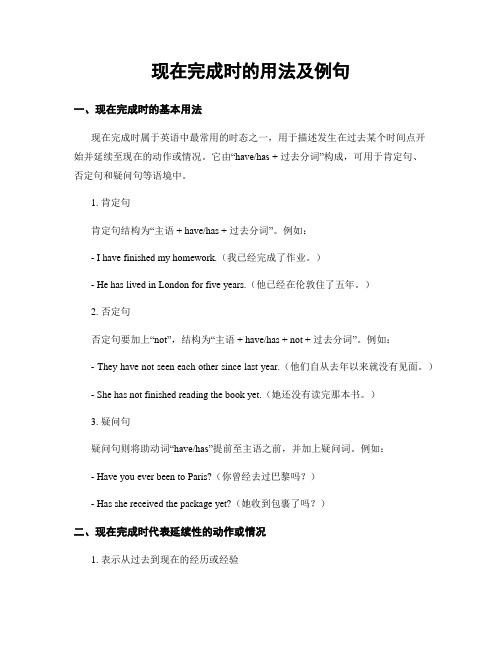
现在完成时的用法及例句一、现在完成时的基本用法现在完成时属于英语中最常用的时态之一,用于描述发生在过去某个时间点开始并延续至现在的动作或情况。
它由“have/has + 过去分词”构成,可用于肯定句、否定句和疑问句等语境中。
1. 肯定句肯定句结构为“主语 + have/has + 过去分词”。
例如:- I have finished my homework.(我已经完成了作业。
)- He has lived in London for five years.(他已经在伦敦住了五年。
)2. 否定句否定句要加上“not”,结构为“主语 + have/has + not + 过去分词”。
例如:- They have not seen each other since last year.(他们自从去年以来就没有见面。
)- She has not finished reading the book yet.(她还没有读完那本书。
)3. 疑问句疑问句则将助动词“have/has”提前至主语之前,并加上疑问词。
例如:- Have you ever been to Paris?(你曾经去过巴黎吗?)- Has she received the package yet?(她收到包裹了吗?)二、现在完成时代表延续性的动作或情况1. 表示从过去到现在的经历或经验现在完成时常用于描述一个人在过去某个时间开始并延续至今的经历或经验。
例如:- I have traveled to many countries.(我去过很多国家。
)- She has studied English since she was a child.(她从小就学习英语。
)2. 表示动作刚刚结束现在完成时也可用于表示刚刚发生、刚刚结束的动作,强调此动作对现在造成的影响。
例如:- I have just finished cooking dinner.(我刚煮完晚餐。
现在完成时讲解及练习(含答案)
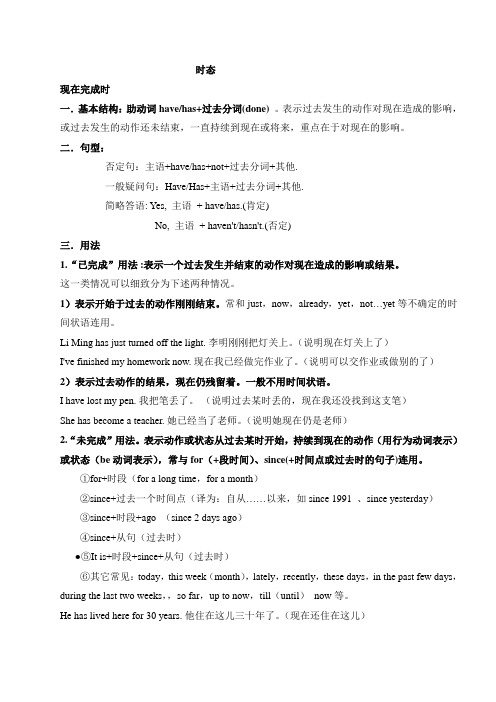
时态现在完成时一.基本结构:助动词have/has+过去分词(done) 。
表示过去发生的动作对现在造成的影响,或过去发生的动作还未结束,一直持续到现在或将来,重点在于对现在的影响。
二.句型:否定句:主语+have/has+not+过去分词+其他.一般疑问句:Have/Has+主语+过去分词+其他.简略答语: Yes, 主语+ have/has.(肯定)No, 主语+ haven't/hasn't.(否定)三.用法1.“已完成”用法 :表示一个过去发生并结束的动作对现在造成的影响或结果。
这一类情况可以细致分为下述两种情况。
1)表示开始于过去的动作刚刚结束。
常和just,now,already,yet,not…yet等不确定的时间状语连用。
Li Ming has just turned off the light. 李明刚刚把灯关上。
(说明现在灯关上了)I've finished my homework now. 现在我已经做完作业了。
(说明可以交作业或做别的了)2)表示过去动作的结果,现在仍残留着。
一般不用时间状语。
I have lost my pen. 我把笔丢了。
(说明过去某时丢的,现在我还没找到这支笔)She has become a teacher. 她已经当了老师。
(说明她现在仍是老师)2.“未完成”用法。
表示动作或状态从过去某时开始,持续到现在的动作(用行为动词表示)或状态(be动词表示),常与for(+段时间)、since(+时间点或过去时的句子)连用。
①for+时段(for a long time,for a month)②since+过去一个时间点(译为:自从……以来,如since 1991 、since yesterday)③since+时段+ago (since 2 days ago)④since+从句(过去时)●⑤It is+时段+since+从句(过去时)⑥其它常见:today,this week(month),lately,recently,these days,in the past few days,during the last two weeks,,so far,up to now,till(until)now等。
现在完成时及其练习

现在完成时语法一、现在完成时的用途①表示过去发生的动作,但此动作对现在留下了某种影响和结果。
Eg.-Would you like to have lunch with me?-No, I've had it. (现在不饿了)②表示从过去开始的动作,此动作一直持续到现在,有可能到目前停止,也可能继续进行。
特点是涉及过去有联系现在动作是过去发生的结果是现代存在的Eg.He has taught here since 1981. 他自1981年就在这儿教书。
可能还要继续教I have't seen her for four years. 我有四年没见到她了。
二.结构助动词have/ has+动词的过去分词构成He has finished his homework三..否定句和一般疑问句1、否定句2、一般疑问句3、肯定回答-Yes, he has. 否定回答-No, he hasn’t.4、常见时间状语①already & yet已经already一般用于肯定句中一般用于否定句和疑问句中。
yet在否定句中通常译为“还”。
Eg.We have already finished our homework.我们已完成作业了。
They haven't finished their homework yet.他们还没有完成作业。
②ever 曾经& never从来不Eg.-Have you ever been to the Great Wall?你曾经去过长城吗-I have never been to the Great Wall.我从未去过长城。
③for & Since自从表示动作或状态从某一时刻开始一直持续到现在for与表示“一段时间”的状语连用表示动作或状态持续了“一段时间”。
Eg.I haven't seen him since 1991.I haven't seen him for two years.非延续性动词的用法现在完成时表示“动作从过去某个时候开始一直持续到现在”或“在某一时间段内动作一直持续谓语动词需要用延续性动词。
高考现在完成时的用法

高考英语现在完成时讲解与练习一、现在完成时的构成1.现在完成时结构:主语+助动词have(has)+动词过去分词否定句:have/has后加not,haven’t/hasn’t一般疑问句:前提have/has2.现在完成时的概念:1)表示过去发生的动作对现在造成的影响或结果。
--Have you had your lunch yet?你吃过午饭了吗?--Yes,I have.I have just had it.是的,我刚吃过。
(现在我不饿了。
)I have already posted the photos.我已经寄过这些照片。
(这些照片已不在我这里了。
)2)过去发生的事情,一直持续到现在(其谓语动词多是延续性动词或表示状态的词)。
I haven’t seen her these days.近来我一直没见过他。
I’ve known Li Lei for three years.我认识李雷已经三年了。
They have lived here since1996.他们自从1996年就住在这儿。
She has taught us since I came to this school.自从我来这所学校,她就教我。
3.现在完成时多与下列时间状语连用:1)用于“过去发生的事,对现在造成的影响或结果”的时间状语有:already(已经→肯定句)yet(还;尚未→否/疑问句)never(从未)ever(曾经→疑问句)just(刚刚)before(以前)2)用于“过去发生的事,一直延续到现在”的时间状语有:for+时间段(for two years)since two years agosince+时间点since2008since he came here.so far(目前;迄今为止)up to now=till now=by now到现在为止;直到现在by the end of this year到今年年末【by the end of…到…末/结束】by the end of this month到本月末during the last(past)few years在过去的几年中in the last(past)months在过去的几个月中all the time总是;一直recently最近these days近几天3.have(has)been和have(has)gone区分1)have/has gone(to)表示某人已经去了某地,人不在这儿。
现在完成时3 用法及时间标记词

注意下列两词的转化,及常用位置
yet 常用于现在完成时的否定句和疑问句句尾。 用于疑问句中, 常译为“已经” 用于否定句中, 常译为“尚未,还”
already 常用于现在完成时的肯定句中,常译为“已经”
例:
— Have you had your breakfast yet? 你已经吃过早餐了吗?
— Yes, I have already had it. 是的,我已经吃过了。
— No, I haven’t had it yet. 不,我还没有吃过。
for 与 since 的区别
for 后接 时间段 since后接 过去时间点 或 一般过去时的句子
如:
I have known him for three years. 我认识他有三年了。 We have lived here since 1998. 我们从1998年就住在这里了。 She has read many books since she was a little girl. 她从小时候开始就读了很多的书。
2. 现在完成时与 for / since 等引导的持续性时间状 语 或 these days,so far等包括“现在时间”在内 的时间状语连用。
如: I have known him for six years. 我认识他六年了。
The doctor has saved many people’s lives so far. 到目前为止,这位医生已挽救了许多人的生命。
现在完成时的时间状语:
1. 现在完成时与不明确的过去时间状语副词 before, just,already,yet,ever,never 等连用。
如: I haven’t seen him before. 我以前没有见过他。
初中语法 现在完成时练习(无答案)

现在完成时一、现在完成时的基本概念1、定义用来表示之前已经发生或完成的动作或状态,而其结果却和现在有联系: 动作或状态发生在过去,但它的影响现在还存在。
They have left. --他们已经离开了,也就是说现在他们人不在这里I have had my lunch. --我已经吃过午饭了,也就是说我现在不饿也可表示持续到现在的动作或状态。
He has learned English since 2001. --从2001年开始学的,现在还在继续学着呢2、构成have (has) +过去分词。
规则变化的过去分词与过去式的变化一样,在动词词尾加ed; 不规则变化的过去分词见不规则动词表,需要同学们记忆。
3、句型:肯定句:主语+have/has + done +其他否定句:主语+have/has +not + done +其他has+ not = hasn’t have+ not = haven’t一般疑问句:have/has +主语 +done+其他?回答:Yes , …have/has. No, …hasn’t/ haven’t.特殊疑问句:疑问代词/副词+一般疑问句二、现在完成时的主要用法用法1:强调过去发生的动作对现在产生的结果或影响(既涉及过去,又联系现在)-- It’s so dark. --Someone has turned off the light.(有人刚把灯关了,对现在造成的结果是:现在很黑)-- Are you free? --I have finished my homework. I am free.(我已经完成了家庭作业,对现在造成的结果是很有空)用法2:表示过去已经开始, 持续到现在的动作或状态.常与since + 过去的时间点,for + 一段时间,so far 等时间状语连用。
I have learnt English for more than ten years. 我已经学了10多年的英语。
- 1、下载文档前请自行甄别文档内容的完整性,平台不提供额外的编辑、内容补充、找答案等附加服务。
- 2、"仅部分预览"的文档,不可在线预览部分如存在完整性等问题,可反馈申请退款(可完整预览的文档不适用该条件!)。
- 3、如文档侵犯您的权益,请联系客服反馈,我们会尽快为您处理(人工客服工作时间:9:00-18:30)。
现在完成时(一)一、用所给动词的适当形式填空。
1. _________ you ever _______ (write) to your friend in English.2. She ________ (give ) concerts all over the world.3. They _________(see) the film. They don’t want to see it again.4. David _______(take) many photos of stone animals before.5. Daming _________(not try) skiing before.二、按要求改写下列句子,每空一词。
1. Tony has washed his clothes.(改为否定句)Tony ______ ______ his clothes.2. We have ever been to Shanghai. (改为否定句)We have______ ______ to Shanghai.3. I have swum in the sea.(改为一般疑问句,并作肯定回答)----_________ you _________ _________ in the sea?----_________, I ___________.4. My parents have visited Tian’anmen Square. (改为一般疑问句,并作否定回答)----_________ your parents _________ Tian’anmen Square?----No, _______ _________.5. She ate two apples yeasterday.( 改为现在完成时)She ________ ever_________ two apples.三、单项选择。
1. Has John _________ Beijing _______ Shanghai?A. leaving; toB. left; toC. left; forD. leaving; for2. I think if you’ve lost the library book, you must_________ it.A. pay forB. payC. spend onD. take3. ---Have you ________ your key?--- No, I’ve _______ for it everywhere, but I can’t find it.A. find; lookedB.looked; foundC. found; lookedD. looked; looked4. I’ve ________ met her before, so I don’t know her.A. neverB. everC. justD. yet5. ---Could you _____ me your bike? --- Sorry, Tom _____ it already.A. borrow; has lentB. borrow ; lendC. lend; has borrowedD. lend; borrow现在完成时(二)一、单项选择。
1. —_______ you _______ your homework? ----Y es, I have.A. Do; doneB. Did; doC. Have; doneD. Have; do2. ----_______ you _____ to Xi’an? ---Y es. I went there last month.A. Did; wentB. Are; goingC. Have; goneD. Have; been3. Xiao Y ong _______ his uncle in Australia next month.A. will seeB. seesC. has visitedD. wanted to see4. ---Is your mother in New Y ork? ---No, she ________ America.A. has never gone toB. has never goneC. has never been toD. has never been5. I ________ already _____ a letter to Mr Smith. What about you?A. was; writingB. have; writtenC. am; writingD. had; written6. ----Why do you stand outside your room?----Because I __________ my key in it.A. have forgetB. have forgottenC. have leaveD. have left7. —When will you do your work?— I ______ just_____ it.A. have; doneB. was; doneC. was; doingD. is; doing8. Y ou_________ around the world. Let’s start next week.A. have traveledB. haven’t traveledC. don’t have travelledD. are travelling9. ----Has your sister seen the film? ---Y es. She ______it two days ago.A. didB. have seenC. sawD. sees10. He_________ to the space station and he will reach there one day.A. beenB. has beenC. hasn’t goneD. has gone二、根据汉语完成句子。
1. 美好的旧时光已经悄然而去。
The good old time_________ ________ quietly.2. 这个运动员已经获得了三枚金牌。
The athlete ________ already ________ three gold medals.3.他为英国广播公司工作过。
He ________ever _________ for the BBC.4.我刚给布什总统写了一封信。
I _________ just ________ to President Bush.5. 你从未见过真的宇宙飞船吗?_________ you never _________ a real spacecraft?现在完成时(三)一、选用never, already, yet, since或for完成句子。
1. He has _______ read the book twice.2. Have you worked on the farm __________ three years ago?3. ---Haven’t you had your breakfast_________? ---Y es, I have.4. The Wangs have lived in the old house ______ about thirty years.5. The little boy has ________ seen his mother, so he doesn’t know her.二、根据所给单词或汉语提示,用其适当的形式完成句子。
1. ---How many schools ______ Project Hope ______ since 1989? (build)---Sorry, I don’t know.2. Miss Liu _________ us English last term. (teach)3. The students _________ in the school since two years ago. (study)4. ---How long ________ you ________the computer?---For half a year. (买)5. They _________ here for five minutes.(离开)三、单句改错。
1. So far we learned about 2,000 English words.2. Weiming has joined a soldier for two years.3. Mary has never gone to Canada.4. My father has been in Ji’nan three days ago.5. He has written the book since 2004 ago.一、1. Have, written 2. has given 3. have seen 4. has taken 45. hasn’t tried二、1. hasn’t washed 2. never been 3. Have, ever swum; Y es, have4. Have, visited; they haven’t5. has, eaten三、1----5 CACAC一、1---5 CDACB 6----10 DABCA二、1. has gone 2. has; got 3. has; worked 4. have; written5. Have; seen一、1. already 2. since 3. yet 4. for 5. never二、1. has, built 2. taught 3. have studied 4. have, had 5. have been away三、1. learned---have learned 2. joined---been 3. gone---been4. has been—went5.去掉ago。
